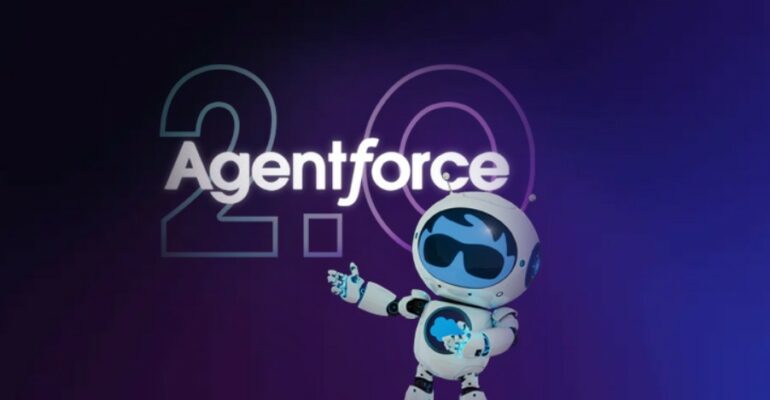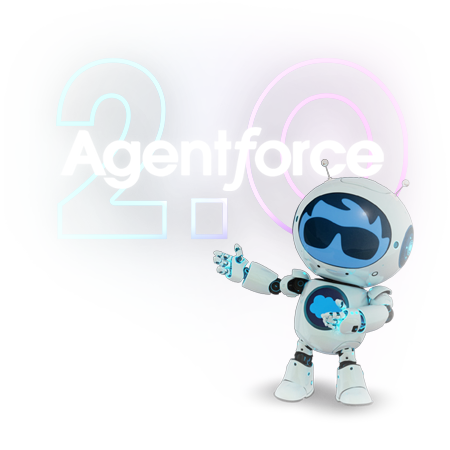
Agentforce 3.0 vs. 2.0 – The Next Evolution of AI Agents

By Alen Alosious
13th Feb, 2025
Introduction
Since its debut in late 2024, Salesforce’s Agentforce has evolved rapidly. Version 2.0 introduced domain‑specific skills, MuleSoft integrations and natural‑language agent builders. However, early adopters reported challenges with visibility, control and interoperability. On 23 June 2025, Salesforce released Agentforce 3.0, addressing these gaps and positioning the platform as the backbone of enterprise AI orchestration. This section dives into the technical enhancements and their implications for regulated industries.
Recapping Earlier Versions
- Agentforce 1.0 (2024): Launched with a handful of autonomous skills and a nascent agent builder. It focused on service‑desk automation and simple Slack actions.
- Agentforce 2.0 (Dec 2024): Added pre‑built skills for Sales, Service, Marketing and Tableau. Integrated with MuleSoft to allow agents to call external APIs. Introduced the first version of the Atlas Reasoning Engine with retrieval‑augmented generation (RAG).
- Limitations: Lacked visibility into agent actions, limited integration standards, and required technical expertise to troubleshoot behaviours. Customers needed to implement custom logging and governance.
What’s New in Agentforce 3.0
-
- Command Center for Observability. The new Command Center offers a unified pane to monitor agent health, adoption metrics and performance anomalies. Built on Salesforce Data Cloud and OpenTelemetry, it traces every agent interaction and streams logs to monitoring tools like Datadog and Splunk. Real‑time alerts notify administrators of latency spikes, error rates or unexpected behaviours.
- Model Context Protocol (MCP) & AgentExchange. Agents can now plug into any enterprise system using MCP—a universal protocol that specifies context, permissions and input/output schemas. MuleSoft connectors convert REST and SOAP APIs into MCP services, and Heroku AppLink hosts custom MCP endpoints. An expanded AgentExchange provides over 30 plug‑and‑play actions, from generating invoices via PayPal to retrieving signed NDAs from Box. This drastically reduces integration effort.
- Enhanced Atlas Engine. The Atlas reasoning architecture now supports multi‑model execution (OpenAI GPT‑4 Turbo, Anthropic Claude, future Google Gemini) with automatic fallback. Response streaming delivers answers progressively to end users, and built‑in web search fetches external information to ground responses. Salesforce reports up to 50 % faster agent responses.
- Global Availability & Multilingual Support. Agentforce 3.0 rolls out in Canada, the UK, India, Japan and Brazil and supports six additional languages, with plans for more. FedRAMP High certification opens the door for government use cases.
- Flexible Pricing & Pre‑Built Actions. Salesforce introduced flex credits and dedicated agent licences, reducing cost uncertainty Over 100 pre‑built industry actions allow quick deployment without writing custom skills.
Technical Considerations
- Security: MCP enforces role‑based access control and audit logging. Each agent call includes a JWT token with scope and expiry, verified by the target service. Administrators can approve or revoke agent permissions centrally.
- Testing & Simulation: The Command Center includes a Test Harness that allows developers to simulate agent actions at scale, inject state and evaluate outputs. This helps detect prompt injection and data leakage before production.
- Data Residency: With Data Cloud integration, agent session data can be stored in region‑specific data centres. This is critical for complying with Indian data‑protection laws.
- Migration: Customers on Agentforce 2.x can migrate by enabling MCP connectors and switching to the new Atlas engine. Salesforce provides backward compatibility for existing skills.
Industry Use Cases
- Healthcare & Life Sciences: UChicago Medicine used Agentforce to optimise patient support, seeing reductions in call‑handle time and improvements in patient retention. With 3.0, hospitals can track agent performance in real time, ensuring compliance with clinical protocols.
- Insurance: Agents can automate claims intake, cross‑system data retrieval and customer notifications. The Command Center helps carriers monitor agent behaviour during regulatory audits.
- SaaS: Software vendors can embed agents in their products to handle onboarding, subscription changes and support. MCP enables secure integrations without exposing internal APIs.
Conclusion
Agentforce 3.0 represents a leap forward in enterprise AI automation. By addressing observability, interoperability and scalability, it prepares businesses to deploy agents safely and effectively. For regulated industries in India, the ability to monitor and govern agent behaviour is especially valuable. Organisations should plan pilot programs to familiarise teams with the Command Center and MCP while gradually expanding agent use cases.
Frequently Asked Questions
Q: Do we need to rewrite our agents when upgrading to 3.0?
No. Existing agents will continue to work. However, to leverage MCP and the new observability features, you should refactor skills into MCP‑compatible services and register them in AgentExchange.
Q: How does the Command Center handle sensitive data?
Data Cloud stores session traces with field‑level security. Access is restricted based on user roles, and sensitive fields are encrypted. Logs can be exported to SIEM tools for retention policies.
Q: What are flex credits?
Flex credits are a consumption‑based pricing model that covers agent actions, LLM usage and premium features. They provide predictable costs compared to per‑conversation pricing.
Q: Can Agentforce integrate with on‑premises systems?
Yes. Using MuleSoft’s hybrid connectors and MCP, agents can call on‑prem APIs. Heroku Private Spaces also allow hosting custom MCP services within a VPC.
Q: Is Agentforce approved for healthcare use?
Yes. Agentforce 3.0 complies with HIPAA and other health‑information regulations when configured correctly. FedRAMP High certification attests to its security posture.
